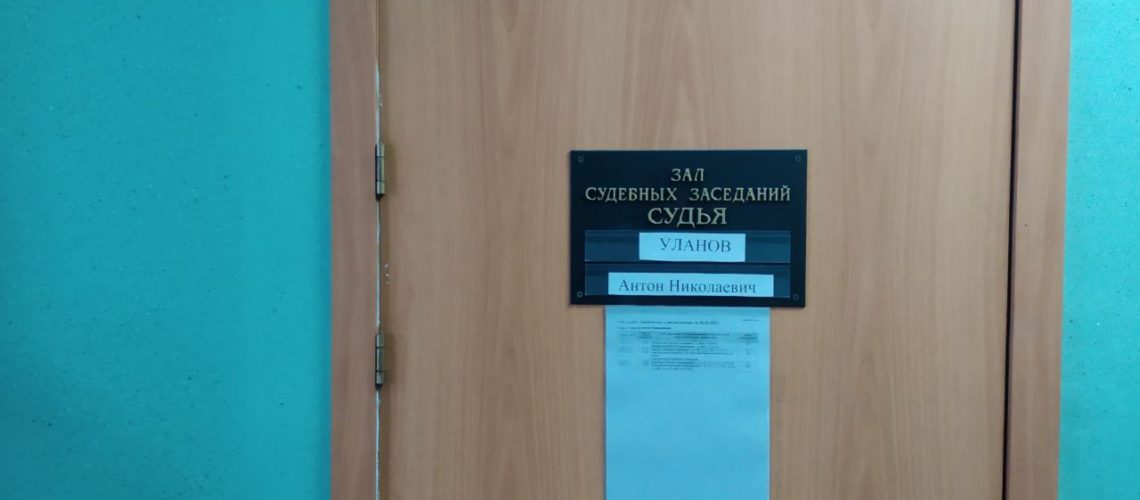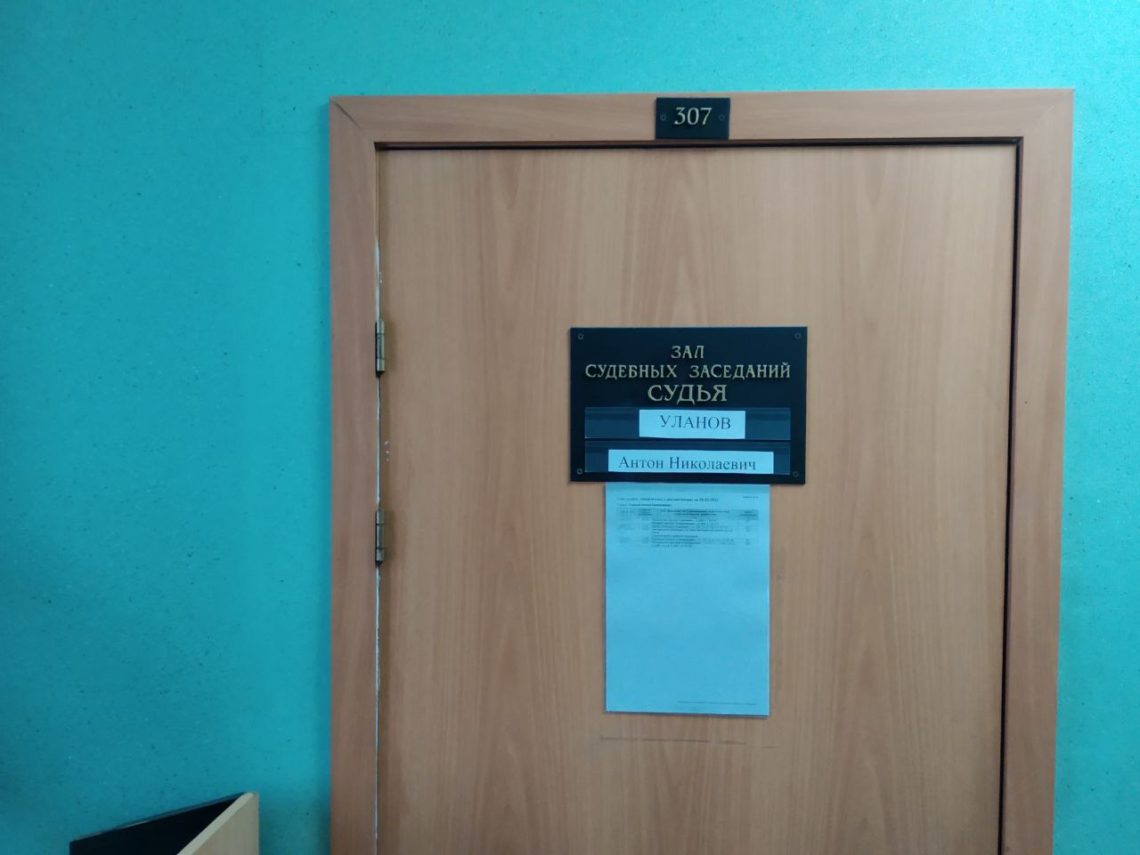

The hearing began an hour later than scheduled due to a delay from the previous hearing.
Mogilevsky was brought in, and defenders Skurtu, Safronov, Zaitsev, and the prosecutor Malygin were present.
Judge Ulanov reads the appearance and reports that none of the called witnesses appeared. He asked the participants if they had any motions.
Attorney Skurtu filed a motion to remove the “member of a public” (i.e., me) from the courtroom due to the fact that audio recording of the hearings was being conducted without the court’s consent, and this audio recording was effectively a transcript maintained by the secretary. Furthermore, this audio recording had been uploaded to the internet with information about the judge’s arrivals/departures, hearing delays, all questions, etc. He believed that “this individual” had violated the established procedures for attending court sessions, conducted an illegal recording, and subsequently posted it online.
As evidence, he presented a publication about the previous hearing on the courtmonitoring.org website from his smartphone.
The positions of the other defenders were similar. Mogilevsky expressed surprise and shrugged in bewilderment. He attempted to ascertain my stance on the case – whether I was “for” or “against” him – but ultimately stated that he trusts his defenders and supported the motion.
The prosecutor also reviewed the publication from Skurtu’s phone and then commented on the motion. Since the hearing was open, transparency was presumed, including the participation of the public, and he believed that in this format, there were no grounds for removal.
The Court: In the end, the defense insists on removing the public basing on the provisions of… what law?
Skurtu: As far as I understand, the regulations of the court hearing?
Having heard the positions of both sides, Judge Ulanov denied the motion basing on the provisions of Article 241, paragraph 5 of the Criminal Procedure Code of the Russian Federation. Persons present at the hearing have the right to make audio and written recordings, and no clear violations of the session rules were observed.
Next, the prosecutor filed a motion for the presentation of written testimonies of absent witnesses. Mogilevsky requested a recess to consult with the defenders. After a five-minute break, Mogilevsky and his defenders expressed their position on the motion, stating that they agreed to the disclosure of testimonies of all summoned witnesses except Generalova and Raskina, whom they considered necessary to summon and question in court once again.
The presiding judge granted the prosecutor’s motion regarding the disclosure of testimonies of those witnesses agreed upon by the defense.
The prosecutor proceeded to read out the case materials.
Protocol of the interrogation of Irina Dmitruk dated February 25, 2022.
Dmitruk, along with other experts, conducted a comprehensive forensic medical examination as part of a criminal case involving Vladimir Smirnov. The questions concern the fact that a different case number is indicated on the first page of the expert conclusion, which does not correspond to the case number related to Mogilevsky. Additionally, on two pages, Smirnov is referred to by the initials V. I., and the date of Smirnov’s hospitalization is incorrectly specified. Dmitruk, in response to the investigator’s questions, confirms that these are technical errors and provides the correct writing of the mentioned fragments.
Disclosing the protocol of Victor Golovin’s interrogation, dated June 10, 2020:
“I have known K. S. Urikh for about 7 years; we met while working together. Golovin is involved in shooting various videos, including some for Urikh. At present, they have both a work-related and friend-related relationship. He does not know Mogilevsky. On October 10, 2017, Urikh transferred 35,000 rubles to Golovin’s bank card, and then he took Golovin’s phone and transferred the specified amount from Golovin’s account to Mogilevsky’s account using the ‘Sberbank Online’ application. Instances of Urikh transferring money from the witness’s card were rare; this transfer may have been the only one. He did not ask Urikh what it was for, as they had a trusting, friendly relationship. After the witness was called for questioning by the Investigative Committee, Urikh informed him that the 35,000 rubles transferred from his account were a bribe or a ‘kickback’ for an employee of PNI № 9 (psychoneurological dispensary № 9), Mogilevsky, with whom Urikh had a contract in 2017 to trim the beards and mustaches of the residents of the dispensary. Mogilevsky demanded this amount from Urikh so that he could carry out the contract and receive the corresponding payment. If the witness had known in 2017 that Urikh was transferring these funds as a bribe, he would not have given his consent for the transfer from his card. Golovin himself had no joint business agreements with Mogilevsky.”
Protocol of the interrogation of Alexey Molodkin dated June 10, 2020.
I have known K. S. Urikh for about 10 years, and our relationship is both professional and friend-related. We engage in joint commercial activities, providing services for men’s haircuts in the “CHAIN” barbershop. Most of the barbershops are registered under Urikh’s individual entrepreneurship (IE), one under my IE, several under IE Barinov, and some are located in Moscow and registered under the LLC “Chain Barbershop” managed by our partner Rodin. I am not familiar with Mogilevsky.
On April 26, 2017, under similar circumstances, Urikh transferred 30,000 rubles from my account to Mogilevsky’s account. During that period, Urikh frequently used my bank account for transactions related to the barbershop’s current activities, so I had no questions regarding this transfer. I did not know that it was a bribe, and I only learned about it later when Urikh informed me that he needed to go to the Investigative Committee for questioning. I, Alexey Molodkin, had no connection to Urikh’s contract with PNI № 9 (psychoneurological dispensary № 9).
The protocols of the interrogations of Pavel Rodin dated June 10, 2020, Alina Barinova dated January 28, 2021, and Vsevolod Barinov dated February 25, 2021, are similar. All witnesses were acquainted with Urikh and allowed him to make transfers through their accounts. The only difference lies in the amounts.
In the protocol of Barinov’s interrogation, there is also a record of the investigator’s question regarding Mogilevsky’s statement during the investigation that at the beginning of 2017, he lent Urikh a sum of 300,000 rubles, which Urikh needed for rebranding their business. Barinov responds that the rebranding of their business did indeed take place, but it occurred in the middle of 2017. Therefore, it would be illogical for Urikh to borrow money at the beginning of the year for this purpose. Additionally, 300,000 rubles is an insignificant amount for such activities, as the rebranding ultimately cost around million rubles. The rebranding was paid for from the profits they had earned from their commercial activities since 2015, and these funds were completely transparent. There was no situation where Urikh brought 300,000 rubles and claimed it was for rebranding. Thus, Mogilevsky’s statement in his testimony appears to be untrue, but the motive behind his false testimony is unknown.
The protocol of Nikolai Ustinov’s interrogation from February 2, 2021, states the following:
Nikolai Ustinov worked as a psychiatrist at PNI № 9 (psychoneurological dispensary № 9) from 2009 to 2020. In the final years, he worked in the first department of the quarantine reception.
On October 25, 2019, Ustinov was on a 24-hour duty shift at the institution. He does not remember all the details, but recalls that he was likely called to the mentioned department to examine Vladimir Smirnov during his rounds. Smirnov was conscious and responsive during the examination. Ustinov noted an elevated body temperature and necrotic lesions during the examination. As a result, Ustinov called the emergency medical services and issued a referral for hospitalization. Smirnov was then hospitalised at City Hospital № 15 due to signs of pneumonia. Ustinov’s decision to hospitalize Smirnov was primarily based on the pneumonia diagnosis, with the bedsores being considered a secondary condition. Ustinov is not certain whether the presence of deep bed sores with signs of necrosis is a sufficient reason for hospitalization from PNI № 9 (psychoneurological dispensary № 9), as the institution lacks a surgical doctor and a license for surgical treatment. However, in practice, employees of the institution always called a surgical doctor, who either arrived on-site or the patient was transported to a polyclinic. Ustinov is unaware of why other doctors at the institution did not make the decision to hospitalize Smirnov before October 25, 2019. He also does not know about a medical examination of Smirnov by a forensic medical expert on that date, during which Mogilevsky, the deputy director of the institution’s medical department, claimed that there were no grounds for hospitalization.
Protocol of the interrogation of specialist Andrey Singaevsky dated February 4, 2020
For a year and a half, he has been Deputy Chief Physician for Surgery at City Hospital № 15. For 30 years, he has worked as a surgeon in medical institutions of the Ministry of Defence and the Ministry of Health, Doctor of Medical Sciences, specializing in surgery.
Question from the investigator: On October 18, 2019, Smirnov’s bedsores with necrotic discharges were diagnosed late, and hospitalization was only carried out on October 25, 2019, at City Hospital № 15 with suspicion of pneumonia. As established, in December 2019, Smirnov died of the mentioned disease. The main cause of death was intoxication and pulmonary heart failure, which developed as a result of extensive deep bedsores on the torso, upper and lower limbs, with necrosis and purulent inflammation. What actions should the staff of the institution have taken after identifying Smirnov’s bedsores with purulent necrotic discharges?
Singaevsky: It was necessary to immediately send the patient for hospitalization in a surgical ward.
The witness then answers questions from the investigator about the qualifications and medical knowledge of the doctors at PNI № 9 being sufficient to make a decision about the need for Smirnov’s hospitalization for surgical care. Having a higher education diploma already implies having the necessary knowledge.
All the patients who arrive at the reception of the City Hospital No. 15 will be examined and treated by all the necessary specialists. In the presence of urgent grounds for hospitalization, it is carried out regardless of whether there is a referral. Patients from PNI № 9 (psychoneurological dispensary № 9) are usually admitted with a referral only from attending physicians, without prior specialized consultation by a surgeon to the surgical department of the hospital № 15. In any case, if Smirnov had been sent from PNI № 9 (psychoneurological dispensary № 9) to City Hospital № 15 without a referral from a surgeon, upon confirmation of the diagnosis in the admission room, he would have been hospitalized anyway because deep bedsores with necrotic discharges are an unconditional reason for hospitalization and surgery.
Question from the investigator: Could a favorable outcome have been expected if Smirnov had been hospitalised in your institution on October 18, 2019, and had surgery?
Singaevsky: Considering the severity of the main disease, it is definitely impossible to claim that a favorable outcome would have been achievable, but there would have been a better chance of recovery.
After presenting the testimony, Mogilievsky once again requests a recess to consult with the defense team. After the break, the defense provides the court with a list of witnesses they consider mandatory to call and those for whom they see no need for further questioning. The court schedules the interview of the witness and postpones the hearing to April 18, 2022.
© 2019-2021 Independent public portal on impartial trial monitoring
